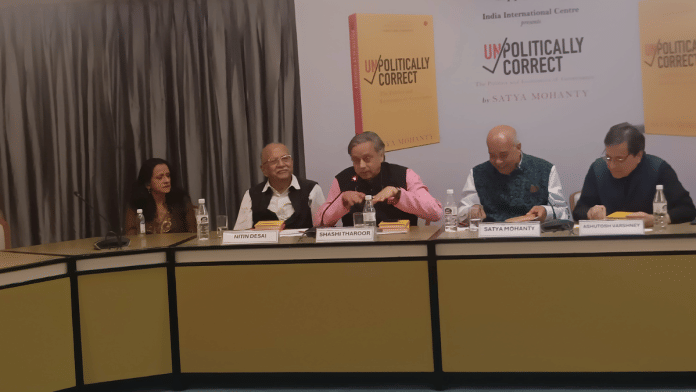New Delhi: Congress MP Shashi Tharoor is a fan of India’s vaccine diplomacy under the Modi government. According to him, it earned some justifiable enhancement of soft power in the less-developed world.
“Many developing countries did benefit from Indian vaccines at a time when the rich countries were shamefully abdicating their responsibilities to the rest of the world and were stocking up on vaccines for their own population,” Tharoor said at the launch of former Union education secretary Satya Mohanty’s book, Unpolitically Correct: The Politics and Economics of Governance, at Delhi’s India International Centre.
Hailing the Modi government’s vaccination policy, Tharoor said that it was also a good example of the private sector stepping up. The government was then able to provide guidance and leverage it as an instrument of Indian diplomacy.
He was joined by author Mohanty, social sciences professor Ashutosh Varshney, and former UN under-secretary general Nitin Desai. The hall was packed with civil servants, many of whom were batchmates of Mohanty, and students of economics.
Contrary to Tharoor’s views, Mohanty’s book takes a critical look at India’s vaccine policy, describing it as premature vaccine nationalism.
Unpolitically Correct focuses on the steep income inequality in India. In the book, Mohanty challenges the view that India’s economic policies are progressive, instead suggesting that these are designed to create a designated class of winners and losers.
“The book is a deep dive into issues of governance, not about the achievements. So issues have been analysed with data and evidence without being vitriolic or retributive,” said Mohanty.
Rising inequalities
Ashutosh Varshney, who teaches international studies and social sciences at Brown University, said that in the proverbial old times, civil servants followed the scholar-administrator model. It focused on developing scholarship through practice and community engagement, something that has come to be ignored by civil servants in recent years.
“Mohanty’s book is proof that the model is still alive. It is not a mere old fantasy,” said Varshney, who is also the author’s friend from JNU.
Varshney added that even if India’s poverty levels have come down during the so-called new liberal era inaugurated in the early 1990s, inequalities have been rising alarmingly.
In China, the top 1 per cent of the population holds 14 per cent of national income, while in India, it holds over 22 per cent. “And wealth is even more concentrated than income,” Varshney said.
If the degree of inequality becomes too large, the wealthy can capture politics, government, and other democratic institutions. Mohanty has watched this happen from inside the government, Varshney added.
Also read: How Priyamvada Natarajan got more women access to the Hubble telescope
Disguised unemployment
The question of employment troubles all in the public policy space. For Shashi Tharoor, however, disguised unemployment is worse in India.
“The rural youth are essentially deemed to be employed in farms, where they are not required. They are de facto unemployed, so real unemployment is already worse than the world record levels we’re going through,” he said.
The government sought a solution for unemployment in manufacturing, Tharoor added. It made a real effort with the ‘Make in India’ campaign and subsequently the PLI (Production Linked Incentive) campaign.
“Neither has taken off and it has not, in fact, given us returns on investment. So where are we going to find solutions to employment? Certainly, nobody has any good answers,” said Tharoor.
Varshney added to this by highlighting the core problem with Indians’ dependence on agriculture: We cannot have 45 per cent of our population dependent on agriculture, which generates only 12 per cent of GDP.
“For peasant welfare, for farm welfare, or rural welfare to obtain, people must leave the countryside,” he said. China has less than 30 per cent of the population in agriculture today.
An audience member asked the panel why India can’t have another Green Revolution.
Varshney replied that a more pressing need for Indian agriculture is to figure out how to make farming less water and fertiliser-intensive.
“I think greening the Green Revolution is the right way to put it. Not another Green Revolution.”
(Edited by Prasanna Bachchhav)






